Nate's reviews and writings
Fluidity
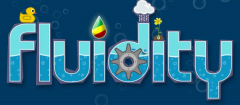 Thanks to the indie uprising, we have a heightened visibility for games that might have gone unnoticed just five years ago. A garage developer's labor of love can now share front page headlines with the AAA behemoths of the industry. Many fine media outlets even make a special effort to cover these smaller productions. Indie games have become the punk rockers of the industry, offering a lean alternative to overproduced AAA formulas, often with rebellious verve and spunk that resonates with us ninety-nine percenters (and at a price we ninety-nine percenters can afford).
Thanks to the indie uprising, we have a heightened visibility for games that might have gone unnoticed just five years ago. A garage developer's labor of love can now share front page headlines with the AAA behemoths of the industry. Many fine media outlets even make a special effort to cover these smaller productions. Indie games have become the punk rockers of the industry, offering a lean alternative to overproduced AAA formulas, often with rebellious verve and spunk that resonates with us ninety-nine percenters (and at a price we ninety-nine percenters can afford).But even in this new era, where the little guys yield as many pageviews as their big budget competition, an indie game needs to have some innovative hook or bombastic message in order to rise to the top. I can think of no other reason why Fluidity, a brilliant puzzle platformer with Metroidvania elements, has gone largely unnoticed. (Except that the game is marooned on Wii's invisible WiiWare digital distribution service, that is.)
It makes sense, though, doesn't it? So many indie darlings that went big had some kind of divergent aura about them. Limbo and Braid made their names with artsy themes and visuals that you just don't see in big money productions. The cheery brutality of Super Meat Boy, Magicka, and Castle Crashers upgraded them from mere mechanical joys to acclaimed game experiences. Fluidity, on the other hand, lifts its style and mood from airline safety manuals, of all things.
Rhythm Heaven Fever
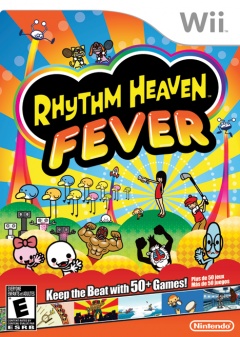 Rhythm Heaven Fever is a procession of adorable cartoon situations. A boy kicks away stray footballs that threaten to ruin his date. A quartet of baby seals tilt back-and-forth in marching-style unison. A tiny monkey taps a tambourine, its big brown eyes gleaming with joy as you repeat its patterns. The game's energetic sweetness is the antithesis of this console generation's characteristic gravelly machismo and brooding drama. It's pure joy.
Rhythm Heaven Fever is a procession of adorable cartoon situations. A boy kicks away stray footballs that threaten to ruin his date. A quartet of baby seals tilt back-and-forth in marching-style unison. A tiny monkey taps a tambourine, its big brown eyes gleaming with joy as you repeat its patterns. The game's energetic sweetness is the antithesis of this console generation's characteristic gravelly machismo and brooding drama. It's pure joy.And yet, it wracks my nerves like a Counter-Strike match. My palms sweat as I constrict the Wii remote in a boa's death grip. My heart races before I even select a song. Like a tiger crouched in the brush, I await the right moment to strike each note with parched eyes. Even with the peppy rhythms as a constant guide, relaxation is a shortcut to failure.
You can't get careless because the game demands total precision. Guitar Hero understands that you have five frets to manage and cuts you some slack if you're a split-second early on the downbeat. Rhythm Heaven Fever scrutinizes to your timing to the millisecond: near the end of the following video, the song approaches 180 beats per minute and splits each beat into 23 blocks; I am tasked with hitting only the center column. There is no room for error.
The smiles and rainbows are a front, as the cute chimps and happy cheerleaders of Rhythm Heaven Fever know exactly how well your internal metronome is running. And they are judging you. Harshly.
de Blob [Video]
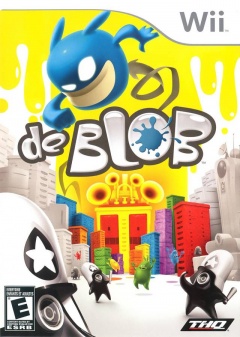 Tim Schafer is funding a game through Kickstarter. That still blows my mind. It's been clear for some time that the existing publisher-developer model isn't ideal, and that the industry would move away from it in time, but I don't think anybody expected consumer-funding to hit the relative mainstream so soon. Of course, Schafer is one of the industry's few big names, and he specializes in an inexpensive, fan-favorite style that has been MIA for years. With that in mind, it's too early to say that the floodgates of fan-funding have been flung open. But maybe we can say that the publishers' dam has a nice new fracture in it.
Tim Schafer is funding a game through Kickstarter. That still blows my mind. It's been clear for some time that the existing publisher-developer model isn't ideal, and that the industry would move away from it in time, but I don't think anybody expected consumer-funding to hit the relative mainstream so soon. Of course, Schafer is one of the industry's few big names, and he specializes in an inexpensive, fan-favorite style that has been MIA for years. With that in mind, it's too early to say that the floodgates of fan-funding have been flung open. But maybe we can say that the publishers' dam has a nice new fracture in it.THQ provides a great example of how a publisher's mismanagement can ruin a developer. Blue Tongue Entertainment was an Australian outfit that developed De Blob for Wii in 2008. The game had a modest budget and a modest advertising campaign; it was a modest success, selling just under a million copies on a console tailor-made for its target audience and lacking in competition at the time. Apparently the dollar signs blinded THQ to circumstances, and it funded a multiplatform sequel that, across four systems, didn't even meet half of the original's numbers. THQ is paying the price for such decisions, but Blue Tongue Entertainment felt the brunt of the blowback when the studio was dissolved and staff was cut.
So my De Blob first hour review and the blockbuster sales it will surely generate come far too late to save Blue Tongue Entertainment from THQ's misguided decisions. Better late than never, I suppose.
Rhythm Heaven Fever [Video]
 It irks me that so many gamers believe the only worthwhile rhythm games are played with guitar peripherals. I love a good Rock Band party as much as the next Keith Moon wannabe, but there are too many wonderful music-based experiments in puzzle games and platformers and RPGs and shooters to cloister yourself in a pile of plastic instruments.
It irks me that so many gamers believe the only worthwhile rhythm games are played with guitar peripherals. I love a good Rock Band party as much as the next Keith Moon wannabe, but there are too many wonderful music-based experiments in puzzle games and platformers and RPGs and shooters to cloister yourself in a pile of plastic instruments.One such experiment was Rhythm Heaven, a strange blend of WarioWare and J-Pop that was one of my favorite Nintendo DS experiences. It didn't have a double platinum soundtrack or intense finger dexterity challenges, but the bubblegum ditties and cute-wacky scenarios got my head bobbing and my hummer humming as few games can.
Fortunately, Rhythm Heaven found enough of a worldwide fanbase to justify the next release, Rhythm Heaven Fever for the Wii. It trades the touch-screen taps and slides for a traditional two button setup, but the bright cartoon eye candy looks even sharper this time around. Budget priced at $30, Rhythm Heaven Fever could be worth a look if you didn't bury your Wii after Skyward Sword.
Fluidity [Video]
 I don't know why I've bothered registering my games with Club
Nintendo these past five years. So many surveys and registration codes,
and what have I received in return? A couple calendars, an LCD relic,
and a set of collectors' pins. It's downright sad next to the free
eReader that Sony sent me.
I don't know why I've bothered registering my games with Club
Nintendo these past five years. So many surveys and registration codes,
and what have I received in return? A couple calendars, an LCD relic,
and a set of collectors' pins. It's downright sad next to the free
eReader that Sony sent me.But times have changed, and this is the new, modern Nintendo! The bold new Nintendo of 2012 not only releases limited-availability demos and supports paid DLC, it actually puts up some worthwhile prizes for Club Nintendo members. Specifically, Club Nintendo now offers a small selection of downloadable games in exchange for the coins that you earn by registering Nintendo products. First party games only, but hey, baby steps.
Fluidity, a WiiWare title of some renown (called Hydroventure in Europe), was one of the games available in December for a fair 150 coins (it's no longer there, but you can only get it on the Wii Shop Channel for $12). The game received positive press and has whiffs of Metroidvania and fluid dynamics puzzles, so that sounds like a winner to me. I've played an hour: am I happy with the coins I spent, or should I have gone for the Mario Folder and Bookmark Set instead? I'd be the coolest kid in homeroom with those folders...
Dead Nation [Video]
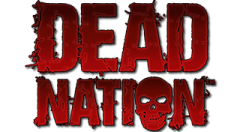 Don't look now, but it's been nine months since reams of personal info and credit card numbers were stolen in the the Great PlayStation Network Hacking. Seeing as how I don't have any suspicious charges to my credit card, I think I can breathe easy. And hey, I got a couple of free games out of Sony's negligence!
Don't look now, but it's been nine months since reams of personal info and credit card numbers were stolen in the the Great PlayStation Network Hacking. Seeing as how I don't have any suspicious charges to my credit card, I think I can breathe easy. And hey, I got a couple of free games out of Sony's negligence!One of the games I received in exchange for the breach of my security was Dead Nation, yet another zombie game with "Dead" in the title. I think we're all a little tired of the undead scene, but I don't see this "fad" fizzling out for a long while. So let's not whine too much and enjoy the good that comes of it before we can move on to the next craze (cowboys, maybe?).
A twin-stick shooter with online co-op and flashlights-in-the-dark scares, Dead Nation might be a nice change of pace from the neon insanity of Geometry Wars and other giants of the genre. An hour of blasting reanimated corpses into bloody gobs later, I'm ready to say that the game is good. How good? This good.
2011 Games Roundup - Nate
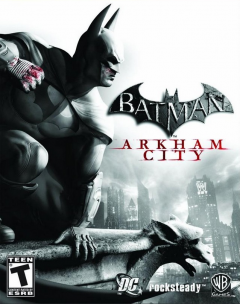 In 2010, I played 73 games. That's a lot of games. Probably too many games. I was pretty sure I would never play that many games ever again.
In 2010, I played 73 games. That's a lot of games. Probably too many games. I was pretty sure I would never play that many games ever again.In 2011, I played 84 games. That's more games that I played in 2010, the year in which I played too many games, probably.
In this edition of my annual gaming inventory, I'll note how many hours I spent with each game, what progress I made, and whether or not I'll come back to the game in the future. I post this knowing that someday, years from now, it will be used in an intervention regarding my time management skills and/or life priorities. I'll be too busy playing Ultimate Angry Birds vs. Capcom to listen to my concerned friends and loved ones, though.
Super Mario 3D Land
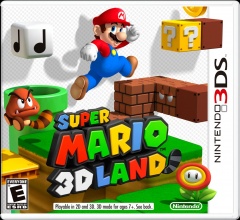 Upon starting Super Mario 3D Land, I was placing internal bets on whether the game would be filed with the 2D or the 3D Mario experiences. Miyamoto and the team say they combined the approachability of 2D Mario with the freedom of the third dimension, but one of the two styles must win out, right?
Upon starting Super Mario 3D Land, I was placing internal bets on whether the game would be filed with the 2D or the 3D Mario experiences. Miyamoto and the team say they combined the approachability of 2D Mario with the freedom of the third dimension, but one of the two styles must win out, right?Exactly fourteen hours of playtime later, the answer still eludes me. There's bits of Super Mario Galaxy and pieces of New Super Mario Bros in the game, and it leans heavily towards the former. What's keeping me from committing 3D Land to the 2D Mario pile is all the Sonic Adventure mucking things up.
Despite the disappointment, elation, and outright disdain that those three names likely bring up, they ultimately mean little for the actual quality of the game. It would be difficult to argue that Super Mario 3D Land is anything other than the Nintendo 3DS' most compelling purchase to date. But it's also the first Mario title in several years that I can't just rave about.
The Legend of Zelda: Skyward Sword
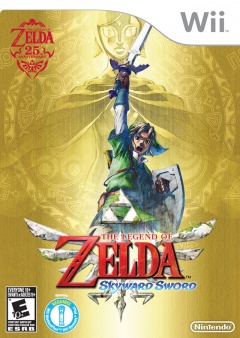 The lasting impression from my recent introduction to the original
Legend of Zelda was its unstructured progression. With only a ghost of a
narrative driving the action and few barriers to limit wanderlust, the
course of my trip through Hyrule was almost entirely up to me. Having played Ocarina of
Time before any other Zelda game, I was surprised to see just how
hands-off the original was.
The lasting impression from my recent introduction to the original
Legend of Zelda was its unstructured progression. With only a ghost of a
narrative driving the action and few barriers to limit wanderlust, the
course of my trip through Hyrule was almost entirely up to me. Having played Ocarina of
Time before any other Zelda game, I was surprised to see just how
hands-off the original was.In contrast, last month's Skyward Sword may be the most linear Zelda experience yet. The newest quest sees Link flying from one compact landmass to the next with hardly any room for side trips. The vast sky of islands is sparser than Wind Waker's nearly endless ocean, and even the surface world below is but three masses of land separated by impenetrable mountain ranges and deserts and forests. This is a Zelda where the path to the next waypoint is often the only path.
Every game in the series since the eighties original has trended towards structure and direction as story progression and ability acquisition gained a greater share of the Zelda spirit. Aesthetic similarities and recurring tropes aside, The Legend of Zelda and Skyward Sword could be mistaken for two wholly separate franchises. For better or worse, Skyward Sword feels like the end state of a slow evolution that Nintendo has been cooking for twenty-five years.
Frankencontroller: The Perfect Pad
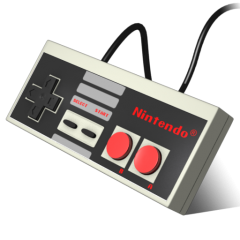 I considered trading down my DS Lite for a DS Phat because I preferred
the clicky buttons of the latter. I refuse to play fighting games with a
360 pad (and only tolerate doing so with a PlayStation controller). I
spent hours fiddling with bluetooth options and buggy amateur programs
just so I could play Super Meat Boy on my MacBook with a Wii remote.
I considered trading down my DS Lite for a DS Phat because I preferred
the clicky buttons of the latter. I refuse to play fighting games with a
360 pad (and only tolerate doing so with a PlayStation controller). I
spent hours fiddling with bluetooth options and buggy amateur programs
just so I could play Super Meat Boy on my MacBook with a Wii remote.Controllers matter to me. A lot.
Though some are preferable to others, no controller is quite perfect. But that's only because nobody asked ME how to design the perfect controller! Instead of waiting around to be contacted by some very smart hardware developer, I figured I might as well lay out a near-perfect pad by stealing the best bits and buttons from controllers past.
I give you: The Frankencontroller.
